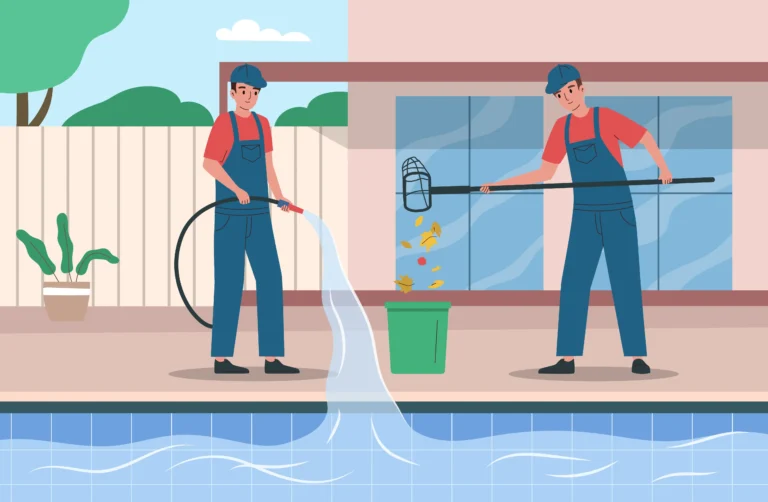Introduction
Owning a swimming pool brings endless enjoyment — from refreshing dips on hot days to family gatherings and backyard parties. However, that enjoyment comes with a responsibility: proper maintenance. Many pool owners, especially first-timers, make simple yet costly mistakes when it comes to keeping their pool clean, balanced, and safe. Neglecting key maintenance steps or misunderstanding chemical care can lead to murky water, damaged equipment, or even health risks.
In this article, we’ll highlight the most common pool maintenance mistakes and show you how to avoid them, ensuring your pool remains sparkling, efficient, and ready for use all season long.
1. Ignoring Regular Cleaning and Skimming
One of the most frequent mistakes pool owners make is failing to clean the pool regularly. Leaves, insects, and debris that accumulate on the surface may seem harmless, but they quickly sink to the bottom, decompose, and affect water quality.
What to do instead:
- Skim daily: Use a net to remove floating debris.
- Brush weekly: Clean pool walls, steps, and corners to prevent algae buildup.
- Vacuum often: Whether manually or with an automatic cleaner, vacuuming keeps the floor spotless.
Regular cleaning doesn’t just make the pool look inviting — it also reduces strain on your filtration system and prevents long-term damage.
2. Neglecting Water Chemistry Balance
Maintaining the right chemical balance is at the heart of good pool care. Yet, many owners only test the water occasionally or rely on guesswork. Imbalanced water can lead to several problems:
- Low chlorine levels allow bacteria and algae to grow.
- High chlorine levels irritate eyes and skin.
- Unbalanced pH can corrode metal parts or cause cloudy water.
What to do instead:
Test your pool water at least twice a week using a reliable test kit. Keep pH between 7.2 and 7.8, chlorine between 1–3 ppm, and total alkalinity between 80–120 ppm. A small investment in a digital water tester can make this process faster and more accurate.
3. Forgetting to Clean or Replace Filters
Your pool’s filter acts as the kidney of the system, trapping dirt, oils, and debris. Many pool owners forget to clean or replace filters, leading to murky water and decreased circulation. A clogged filter also forces your pump to work harder, wasting energy and reducing its lifespan.
What to do instead:
- Cartridge filters: Rinse every 2–4 weeks and replace annually.
- Sand filters: Backwash once a month or when pressure rises 8–10 psi above normal.
- Diatomaceous earth (DE) filters: Backwash monthly and replenish DE powder.
Regular filter maintenance ensures water stays crystal clear and equipment runs efficiently.
4. Overusing Pool Chemicals
When faced with cloudy or green water, many pool owners make the mistake of dumping in excessive chemicals, hoping for a quick fix. Over-chlorination or improper use of shock treatments can damage pool liners, irritate skin, and upset water balance.
What to do instead:
Always follow manufacturer instructions and measure carefully. Use chemicals based on water testing results, not assumptions. If the problem persists, it’s better to consult a professional rather than risk overcorrecting.
5. Not Running the Pump Long Enough
Your pool pump needs to run long enough each day to circulate all the water through the filter — but many owners cut corners to save on electricity costs. Poor circulation allows debris and algae to settle, resulting in cloudy or unsafe water.
What to do instead:
Run the pump for about 8–12 hours per day, depending on pool size and usage. Consider investing in an energy-efficient variable-speed pump, which saves power while maintaining consistent filtration.
6. Skipping Routine Inspections and Maintenance
A pool isn’t just water — it’s a system of interconnected parts: the pump, heater, filter, and plumbing. Ignoring minor issues, like small leaks or strange noises, can lead to major repairs later.
What to do instead:
- Inspect equipment regularly for cracks or unusual sounds.
- Check water levels frequently — low water can damage the pump.
- Schedule a professional inspection at least once a year to catch potential problems early.
Conclusion
Pool maintenance doesn’t have to be complicated, but it does require consistency and awareness. By avoiding these common mistakes — from ignoring water chemistry to neglecting filtration — you can keep your pool water clear, safe, and inviting. Regular care not only extends the life of your pool and equipment but also ensures that every swim is a pleasant experience.
A clean, well-maintained pool is more than a luxury; it’s an investment in your home, your health, and your peace of mind.

